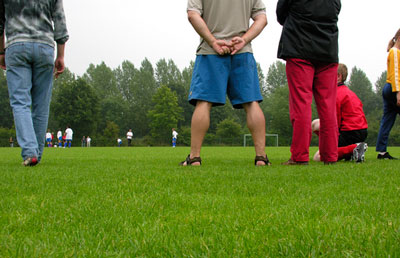Sep 03, 2015 • 5 min read
6 Ways You May Be Ruining Sports for Your Kid
Posted in:
Parents: somewhere, at some point, a change occurred. Youth sports became professionalized. We have imposed an adult viewpoint of sports onto our youth. In doing so, the system has indeed created better talent, however along with it has come higher expectations, stressed out athletes, more frequent injuries, less creativity and more drop outs than ever before.
 The goal of athletics is to create healthy, well-adjusted people who not only enjoy the game and the social interactions, but also the many benefits that sport can teach such as, teamwork, discipline, communication, persistence, focus and mental toughness. Although we all mean the best, here are six ways you may be teaching the opposite:
The goal of athletics is to create healthy, well-adjusted people who not only enjoy the game and the social interactions, but also the many benefits that sport can teach such as, teamwork, discipline, communication, persistence, focus and mental toughness. Although we all mean the best, here are six ways you may be teaching the opposite:
- Wanting it more than them: Passion is the most important variable for success in any profession. Yet, the passion must come from within. I get calls every single week from parents wanting our mental coaching for their son/daughter. I have to screen each parent and ask, “Is this something your child wants?” Whatever the situation they have to want it, period. No matter the sport, the best athletes have that passion. They don’t have to be asked to work at it, because they love it.
- Not allowing them to fail: I was at a swim practice and noticed a teenager on the side of the pool, while the others already began. I asked what was the matter, and he replied, “Oh nothing, I forgot my swim stuff and I’m waiting for my mom to drop it off.” He also added some smart aleck remark like, “She is really taking her time too.” When we remove the life lessons that sports can provide, we remove the failure, setbacks and allowing them to take ownership of their mistakes. The safety net for children has become dangerously close to actually touching them. They know mom or dad will take care of it…
- Traveling too early: It’s the gateway drug to specialization.Parents and kids travel to a tournament almost every weekend, that it has become a tourney-cation for the family. A few travel tournaments or matches are great; it’s fun! The danger is that traveling becomes expensive and once they start traveling, it’s too easy to buy the idea that they now have to pick a sport and stay with it. Jumping, running, throwing, all transfer across sports! Playing a variety of sports achieves that goal of skill development. Plus, each sport offers a unique advantage, competitiveness. When they learn to compete in many different sports, they will eventually transfer that skill of competitiveness to their favorite!
- Not emphasizing & rewarding effort: Effort is everything. But, if we only emphasize the outcome, athletes will learn and internalize “all that matters is winning.” This occurs naturally, when we ask, “how was practice,” rather than “how was your day.” If we only emphasize rankings, final scores and talent, then taking risks, addressing weaknesses and competing become afterthoughts. Remember, it’s not who gets there first, it’s who can get there and stay there. Question: Shouldn’t the best 12 year old in the nation almost always be one the best 18 year olds? It rarely happens because winning and outward appearance was rewarded instead.
- Blaming the coach, system or refs: A Division I football coach told me that he has eaten out at restaurants his entire life but has never gone back to the cook to tell him how to make the meal. There are going to be good and not so good coaches. However, our kids learn from both, how we want to learn, treat, and communicate with others, and how we don’t want to. But, it has to be about the kids and their experience, not how we perceive things. A little league coach once told me when he knew parents were talking about him because the kids would no longer look him in the eye. It’s not your role to call or blame coach about playing time, change coaches or schools, or get a lesson every time they play bad.
- Over-communicating with them: There are good opportunities to talk about their performance. Although, during the game is NOT the appropriate time. However, all the time, parents are communicating with their son/daughter. Body language doesn’t talk, it screams, and they can see your negative behavior, pacing up and down the field or court. Stressed out parents create stressed out athletes. Also, the stands can be packed with hundreds or thousands of screaming people, and the ONE voice they will recognize is yours! Avoid coaching them verbally and non-verbally during their play.
Dr. Rob Bell is a Sport Psychology coach. DRB & Associates based in Indianapolis works with professional athletes & corporate athletes, coaches, and teams building their Mental Toughness. His fourth book, Don’t Should On Your Kid: Build Their Mental Toughness, will be released this fall. Follow him on twitter @drrobbell, or check out the new film & e-book, “NO FEAR: A Simple Guide to Mental Toughness.”
